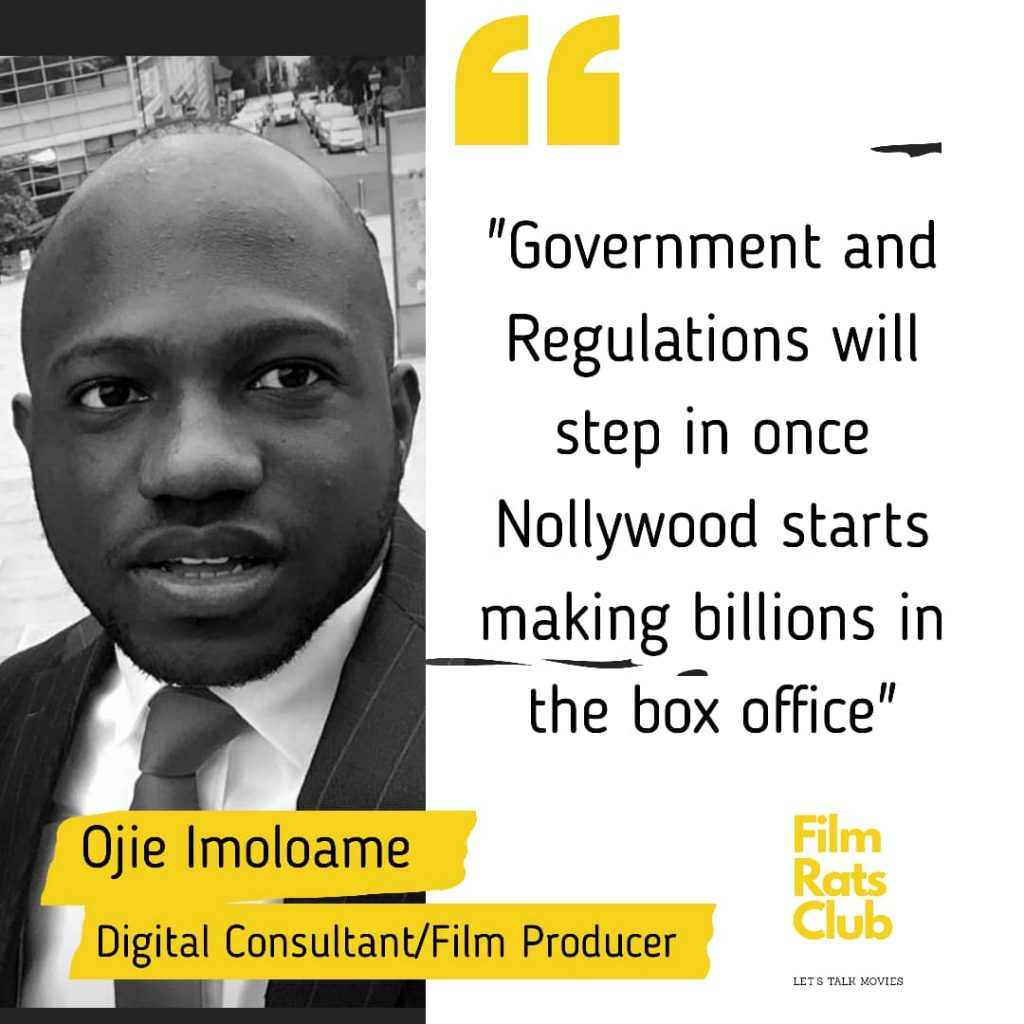Dialogues: How funding in film really works by Ojie Imoloame
Ojie Imoloame is a Digital Consultant and a Film Producer. He engaged the Film Rats Club on source funding and content creation. See transcripts of the presentation. Direct Funding Traditional Studio System Let us look at a traditional studio system, taking Hollywood as a case. Films are conceptualized, developed, produced and distributed by the studios. There are “Major” studios and smaller studios, with the difference essentially is that the majors have more financial capabilities to take on higher budgets such as “Black Panther”, “Frozen 2” and so much more. It should also be noted that production budgets most times are independent of marketing budget, although, both tend to end up forming the total cost of the film. However, in order to remain sustainable and competitive, without a doubt, all studios, major or small seek to invest in productions with the hope of achieving significant returns or simply put, every studio seeks to make “a hit”. Thus, in order to guarantee a hit, studios tend to favour mainstream pictures. These are essentially films that will appeal to as many people as possible. So, take for instance Jordan Peele’s “US”. {Side Note: Though, some may consider horror quite genre/niche and not mainstream enough, the success of “Get Out”, “It”, “Split”, notably from Jason Blum’s “Blumhouse Productions” who specializes in producing low-budget horror pictures, have reinvigorated interest in the genre}. See cost and revenue breakdown here. As seen, the production budget was reportedly $20M and Universal Studios spent an additional $75M on marketing, effectively bringing its total cost to $95M. The global box office receipts closed at a reported $255.2M and the film generated a net profit of $119M. These are the kind of numbers major like to realize from productions. Independent Sources When the picture is considered “artistic” or “genre”, the likelihood that a studio may fund it is low because there is a low likelihood that they will achieve a good return on investment. On this note, the filmmaker may seek independent sources. Crowd Funding “Dear White People”, directed by Justin Simien funded its trailer by IndieGoGo .The trailer was used to generate some buzz and pitch the tone and style of the film to studios in Hollywood, and they eventually sought financing from an independent financier. The film premiered at the Sundance Film Festival, got distribution, performed rather modestly with a boxoffice of $4.6M, and Netflix acquired the TV rights and “Dear White People” the series is currently in its fourth season. Spike Lee funded “Da Sweet Blood of Jesus” with Kickstarter. Pre-Sales Here, the film’s rights to be distributed in several territories are sold to distributors based on the cast, director and script (genre, story, style). The money is used to fund the production. Pre-sales usually occur at film festivals like Cannes for instance. “355” starring international stars; Jessica Chastain, Diane Kruger, Lupita Nyongo, Fan Bingbing Penelope Cruz and directed by Simon Kingberg (“Dark Phoenix”) recently used this approach. Other independent sources are funding are bank loans, personal funds, private or private equity investment or even partnering with big stars to take a lower upfront fee and a share of the profits (See “talent participation” in the “US” breakdown) Nollywood Funding In the case of Nollywood, as we know, most sources of funds are personal savings or the small amounts obtained from the quick turnaround of the movies. This has been the model since 1992 or even before. To be clear, Nollywood does employ the studio system, for example, ‘Grand Touch Pictures’ owned by Chico Ejiro, funded their productions. However, due to the small scale, lack of structured distribution network and transparent reporting and other challenges, it was a bit challenging to seek financing from banks and other institutional investors. However, with the return of cinemas, structured distribution network and transparent reporting and renewed focus on production quality, filmmakers can now seek funding from other sources besides personal funding like banks, PE firms and others. It should still be noted that sourcing for funds for production in Nollywood is still mostly through personal savings or friends/family but there seemingly appears to be a gradual shift from this approach. The Bank of Industry has set up a N1Bil ‘Nollyfund” to support Nollywood productions and support the growth of the industry. Filmmakers like Kunle Afolayan and Jadesola Osiberu have benefited from access to this fund to fund their films (“CEO” & “Isoken” respectively). Private Equity firms have also entered this space such as MBO Capital, who invested in Wedding Party 2. Also, the Government intervened and set up at $200M fund for “Project Nollywood.” The major challenge with seeking funds for Nollywood films is poor quality films and scale of cinema distribution. The typical Nollywood film does not play cinemas internationally particularly due to quality issues, therefore limits it to local cinemas (218 screens across 63 locations as at 2019) unlike Hollywood films that are distributed globally. Once we can fully solve the quality issues and consistently produce exportable films, we will be able to tap into a global cinema distribution network and can also access more funds from a multitude of local and international sources. The shift is changing as, “Isoken”, “King of Boys”; “Wedding Party” successfully obtained foreign cinema distribution. Indirect Sources Product Placement & Partnerships Hollywood has long used product placements for films. “Sky fall” was a walking advert with brands such as Heineken, Adidas, Omega, Aston Martin and others heavily featured in the film. I recall Ecobank partnered with ‘BAP Productions’ for the release of ‘Bling Lagosians’. Almost as something of a coincidence, I happened to be at Ecobank on the opening day of the film and I noticed the staff was asked to dress in “Bling” and the film was promoted on the bank’s platforms. “Merry Men”, if you ever watched it, you will see that it was shot in Transcorp Hilton hotel, Abuja and featured the hotel numerous times. These partnerships would have obviously helped to cushion the production and/or budgets. ‘Ndani,’ ‘Accelerate,’ and

